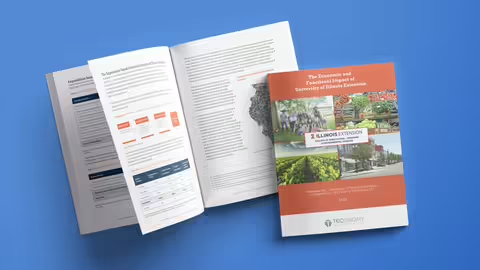URBANA, Ill. - Kim Kidwell, dean of the University of Illinois College of Agricultural, Consumer and Environmental Sciences (ACES), announced a new report today detailing the impact of Illinois Extension, the public outreach and engagement arm of University of Illinois.
Prepared by TEConomy Partners, LLC, a firm specializing in impact assessments, the report values the annual economic and functional benefits of Illinois Extension at over $603 million, about 10 times the $60.9 million annual budget of the university unit.
Extension operates in all of Illinois’ 102 counties, and its programs are developed and adapted to meet local community needs, says Shelly Nickols-Richardson, associate dean and director of Illinois Extension.
“The report assesses and explains Extension’s programs in terms we hope will be informative and impactful to administrators, funders, legislators, and the public,” she says.
“Extension is a driver of economic and societal progress,” adds TEConomy principal Simon Tripp, a co-author of the report. “Extension has the pragmatic, purposefully-designed mission to ensure that research-based knowledge is not confined to academic circles, but is deliberately and professionally provided to individuals and organizations, enabling them to solve problems, adapt to changes and new opportunities, make informed decisions, develop new skills, and carry innovations forward into practice.”
Kidwell ties Extension’s myriad benefits to the university’s very founding, as well as its future.
“Extension’s clients and partners know well the value our educators and programs have in their lives and local communities. This report expresses that value in economic terms, and at the statewide scale we operate,” Kidwell says. “Extension is a sophisticated, ambitious, and integral component of the university, dedicated to the visionary Land Grant mission to translate and apply research and expertise to the challenges and opportunities Illinois communities face.”
With a mix of federal, state, and local funds, both public and private, Extension provided nearly 50,000 educational program sessions in 2019, an average of 960 sessions per week, and made 1.3 million educational contacts at 3,800 locations throughout Illinois.
Popular Extension programs include 4-H youth development, Illinois Nutrition Education Programs, Master Gardener and Master Naturalist volunteer programs, local government education programs, education for farmers and agribusiness, and workforce development.
“Our programs build and sustain Illinois’ economic progress and social well-being across all sectors of society,” Nickols-Richardson says.
The report includes 48 examples of impact that span Extension’s diverse offerings. For each thematic area (agriculture; environment; community and economic development; health, nutrition, and family development; and youth development), the authors discuss challenges and opportunities specific to Illinois and explain how Extension programs generate impact.
“We assessed Extension’s economic impact through two lenses: expenditure-based impacts, and functional or programmatic impacts” Tripp says. “The direct, indirect, and induced effect of Extension’s payroll and other spending amounts to a $126 million annual stimulus to the Illinois economy. And that effect extends statewide, because Extension hires and spends statewide.”
The report quantified programmatic impact through selected examples that span the breadth of Extension, including agriculture, nutrition, health, and youth development.
“The annual benefit of these selected examples was $477.3 million,” Tripp says. “This value is conservative, certainly more akin to a floor than a ceiling. We hope it’s useful for Extension’s funders, stakeholders, and the public to better understand the substantial public value Extension provides.”
SOURCE: Simon Tripp, partner, Economy Partners, LLC
WRITER: Stephen Wald, Senior Coordinator, Public Relations and Government Affairs, Illinois Extension
ABOUT EXTENSION: Illinois Extension leads public outreach for University of Illinois by translating research into action plans that allow Illinois families, businesses, and community leaders to solve problems, make informed decisions, and adapt to changes and opportunities.
